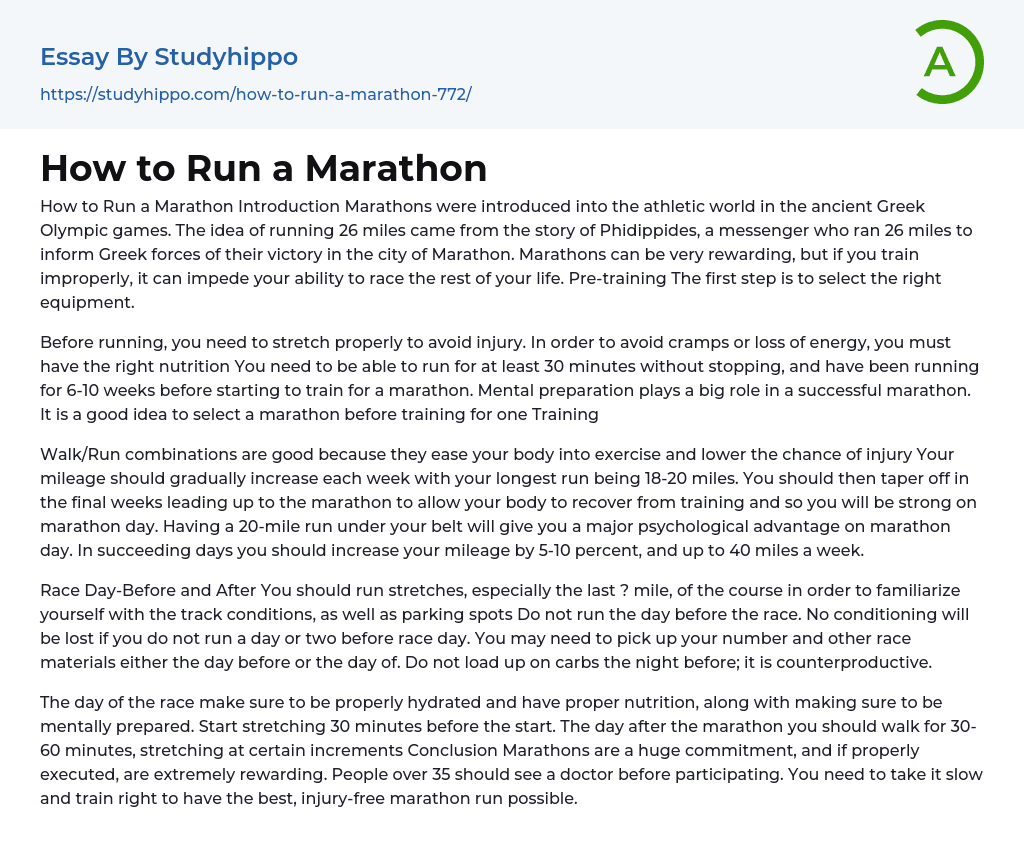Introduction: The origins of marathons can be traced back to the ancient Greek Olympic games, where Phidippides' legendary feat of running 26 miles was born. This distance was covered by him to proclaim Greece's victory in Marathon. While marathons offer immense gratification, inadequate training can hinder your ability to race effectively in the long run. Before starting training, it is important to choose appropriate equipment.
To ensure a successful marathon training, it is important to properly stretch and consume the right nutrition to prevent injury, cramps, or loss of energy. It is advised to establish a consistent running routine for 6-10 weeks and be capable of running continuously for at least 30 minutes prior to marathon preparation. Additionally, choosing a specific marathon beforehand can aid in mental preparation.
The combination of
...walking and running is advantageous as it gradually introduces your body to exercise while minimizing the risk of injury. It is crucial to progressively increase your mileage each week, with the longest run reaching 18-20 miles. As the marathon approaches, it is recommended to lower the intensity of your training in order to allow for recovery and ensure preparedness for the race. A 20-mile run prior to the marathon will give you a notable psychological edge on race day. Furthermore, strive to augment your weekly mileage by 5-10 percent, capping at a maximum of 40 miles.
Race Day - Before and After
Before the race, it is recommended to run stretches, especially the final ? mile of the course, to become familiar with the track conditions and locate parking spots. However, it is advised not to run on the day before the race. Skipping a day or two
of running before race day will not result in any loss of conditioning. You may have to collect your race number and other materials either on the day before or on race day. As for your diet, avoid loading up on carbohydrates the night before as it is counterproductive.
Make sure to stay well-hydrated and properly nourished on race day, ensuring mental preparedness is also important. Begin stretching 30 minutes before the start of the race. The day following the marathon, engage in a 30-60 minute walk, incorporating stretches at specific intervals. Participating in marathons requires great dedication, but with proper execution, they offer significant rewards. Individuals over 35 should consult with a doctor before taking part. To achieve the best marathon run possible, it is crucial to take a slow and appropriate training approach, minimizing the risk of injuries.
- Fight club essays
- Training essays
- Athletic Shoe essays
- Gym essays
- Yoga essays
- Baseball essays
- Basketball essays
- Bodybuilding essays
- Boxing essays
- Football essays
- Golf essays
- Martial Arts essays
- Soccer essays
- Tennis essays
- Volleyball essays
- badminton essays
- cricket essays
- go kart essays
- hockey essays
- scuba diving essays
- snowboarding essays
- wrestling essays
- Surfing essays
- Swimming essays
- Table tennis essays
- Athletes essays
- Running essays
- Ski essays
- American Football essays
- Super Bowl essays
- Taekwondo essays
- Olympic Games essays
- Motorcycle essays
- Benefits of Exercise essays
- Sportsmanship essays
- Virtual Reality essays
- Major League Baseball essays
- Catcher essays
- Jackie Robinson essays
- Kobe Bryant essays
- Anabolic Steroid essays
- The New Yorker essays
- National Football League essays
- Mixed Martial Arts essays
- John Locke essays
- 9/11 essays
- A Good Teacher essays
- A Healthy Diet essays
- A Modest Proposal essays
- A&P essays




